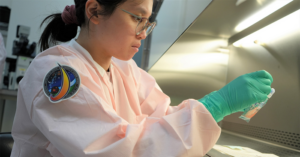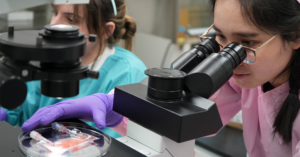Increasing evidence shows that microgravity can accelerate aging, inflammation, and immune dysfunction in human stem cells. During Axiom Space’s first Private Astronaut Mission, the scientists discovered that in low Earth orbit, cancer stem cells appeared to regenerate more easily and become more resistant to standard therapies. The Ax-2 mission will now determine if two inhibitory drugs can reverse the regeneration in a breast cancer organoid model.
The current experiments will expand research on human stem cell aging, inflammation, and cancer in low Earth orbit.

Researchers at the University of California San Diego Sanford Stem Cell Institute have launched several new nanobioreactor experiments on the International Space Station (ISS) via the second Axiom Space Private Astronaut Mission, Axiom Mission 2 (Ax-2). The latest experiments expand their research on human stem cell aging, inflammation, and cancer in low Earth orbit.
Increasing evidence shows that microgravity conditions can accelerate aging, inflammation, and immune dysfunction in human stem cells. Understanding this process is not only helpful for keeping astronauts healthy, it could also lead to better therapies for cancer on Earth.
During Axiom Space’s first Private Astronaut Mission, Axiom Mission 1 (Ax-1), the scientists discovered that in low Earth orbit, cancer stem cells appeared to regenerate more easily and become more resistant to standard therapies. The Ax-2 mission will now determine if two inhibitory drugs can reverse the regeneration in an organoid model of breast cancer.
Tracking health of astronauts’ blood stem cells
Another line of experiments will track the health of astronauts’ blood stem cells before, during and after spaceflight to evaluate the effects of the space environment on stem cell aging, immune function, and cancer stem cell generation.
These projects are part of the NASA-funded Integrated Space Stem Cell Orbital Research (ISSCOR) Center, a collaboration between UC San Diego Sanford Stem Cell Institute, JM Foundation, and Axiom Space. The experiments will take place over 10 days in orbit, with subsequent data collection and analysis performed at UC San Diego.
“Space is a uniquely stressful environment,” says Catriona Jamieson, MD, PhD, professor at the UC San Diego School of Medicine, Koman Family Presidential Endowed Chair in Cancer Research at UC San Diego Health and director of the Sanford Stem Cell Institute. “By conducting these experiments in low Earth orbit, we are able to understand mechanisms of cancer evolution in a compressed time frame and inform the development of new cancer stem cell inhibitory strategies.”
The findings are expected to inform the development of predictive models for cancer and immune dysfunction-related diseases and could lead to the development of new drugs to prevent or treat these conditions during space exploration and here on Earth.
“We are pleased to have the opportunity with our private astronaut missions to advance this important work, aligned with the White House Cancer Moonshot initiatives, adds Christian Maender, executive vice president of in-space solutions at Axiom Space.
Cancer in low earth orbit
In UC San Diego’s initial experiments under the ISSCOR program, the researchers sent blood stem cells aboard the ISS across four launches and found that several pre-cancerous markers were elevated after one month in space. Of particular note was the activation of APOBEC3C and ADAR1, two enzymes that edit DNA and RNA, respectively, and promote cancer proliferation and immune evasion.
The team will now build on these initial findings during the Ax-2 mission.
In the latest launch, the scientists have sent tumor organoid models of leukemia, colorectal, and breast cancer into low Earth orbit, where the microgravity conditions will accelerate insights into how cancers adopt stem cell properties that make them resistant to standard therapy, including dormancy, regeneration, and longevity.

The researchers will also test two ADAR1 inhibitors, Fedratinib and Rebecsinib, to see if the drugs can reverse the process of malignant regeneration and potentially prevent cancer progression. These experiments mark the start of a developing program at the Sanford Stem Cell Institute to expand stem cell translational research and drug discovery in space.
A second longitudinal study will monitor the health of astronauts’ stem cells over time to learn how they are affected by spaceflight. Blood samples will be collected from the crew members before, during and immediately after the mission, with up to five years of annual follow-ups after the trip.
The scientists will assess the activity of DNA and RNA-editing enzymes such as APOBEC3C and ADAR1 in the blood stem cells and cancer organoids. Dysregulation of these enzymes has been linked to immune dysfunction and potential pre-cancer changes, so understanding when and how they become perturbed in the astronauts will allow researchers to develop potential countermeasures.


